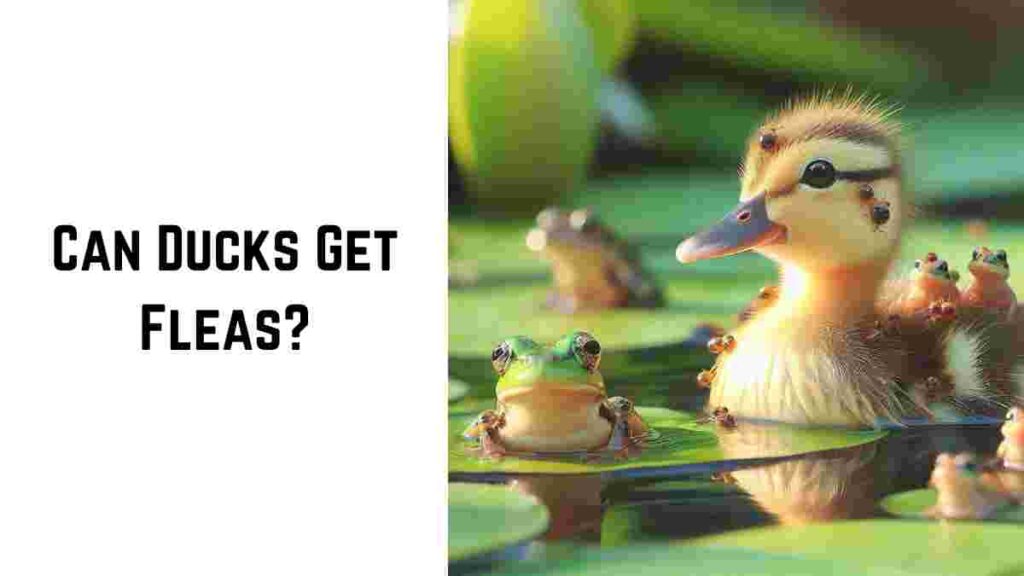Can Ducks Get Fleas: Ducks are fascinating creatures known for their vibrant feathers, unique behaviors, and adaptability to various environments. As with many animals, the question of whether ducks can get fleas is a relevant one for both pet owners and wildlife enthusiasts.
This article explores the topic in detail, examining the biology of fleas, their interaction with ducks, and the broader implications for duck health and habitat management.
Amazing Wooden Duck Houses At Reasonable Cost

Table of Contents
Understanding Fleas – Can Ducks Get Fleas?
Fleas are small, wingless insects that are external parasites, primarily feeding on the blood of mammals and birds. They belong to the order Siphonaptera and are characterized by their laterally compressed bodies, which allow them to move easily through the fur or feathers of their hosts. Fleas are known for their jumping ability, facilitated by powerful hind legs, and their life cycle, which includes egg, larva, pupa, and adult stages.
Table 1: Flea Life Cycle Stages and Characteristics
| Life Cycle Stage | Characteristics |
|---|---|
| Egg | Tiny, white, laid on host |
| Larva | Worm-like, feeds on organic matter |
| Pupa | Protective cocoon stage |
| Adult | Blood-feeding, capable of jumping |
Can Ducks Get Fleas?
While ducks are not the primary hosts for fleas, it is possible for them to become infested under certain conditions. Fleas prefer mammals due to their fur, which provides a suitable environment for eggs and larvae. However, in environments where ducks coexist with flea-infested mammals or in unsanitary conditions, ducks can inadvertently become temporary hosts.
Factors Affecting Flea Infestation in Ducks
- Environment: Ducks living in close proximity to mammals, such as dogs, cats, or wild rodents, are more likely to encounter fleas. Areas with dense vegetation or organic debris can also harbor flea populations.
- Hygiene and Habitat: Ducks kept in clean environments with regular maintenance are less likely to suffer from flea infestations. Conversely, unclean or overcrowded habitats increase the risk.
- Species-Specific Fleas: Some flea species are more adapted to birds than others. While Ctenocephalides felis (the cat flea) and Ctenocephalides canis (the dog flea) may occasionally infest ducks, they are not ideal hosts, and the infestation may not last long.
Symptoms of Flea Infestation in Ducks
If a duck becomes infested with fleas, you may notice the following signs:
- Itching and Scratching: Ducks may exhibit increased preening or scratching behavior.
- Feather Loss: Excessive scratching can lead to feather damage or loss.
- Restlessness: Infested ducks may appear restless or agitated.
- Anemia: Severe infestations can lead to anemia due to blood loss.

Impact of Flea Infestation on Duck Health
Flea infestations can have several adverse effects on ducks, including:
- Skin Irritation: Flea bites can cause irritation and inflammation of the skin.
- Secondary Infections: Scratching can lead to open wounds, making ducks susceptible to bacterial infections.
- Stress: Persistent irritation and discomfort can lead to stress, affecting overall health and well-being.
- Disease Transmission: Fleas are vectors for various pathogens and can transmit diseases to their hosts.
Preventing and Treating Flea Infestations in Ducks
- Environmental Management: Keeping the duck habitat clean and dry is crucial. Regularly removing debris and organic matter can reduce flea populations.
- Separate from Mammals: If possible, maintain a separation between ducks and flea-infested mammals to minimize cross-infestation risks.
- Regular Health Checks: Routine health checks can help detect early signs of flea infestation and allow for prompt treatment.
- Use of Flea Treatments: While many flea treatments are formulated for mammals, some can be safely used for birds under veterinary supervision. Always consult a veterinarian before applying any treatment to ducks.
Broader Implications for Wildlife Management
In natural settings, the interaction between ducks and fleas can influence broader ecological dynamics. Fleas and other parasites play a role in regulating host populations and can impact the health of wildlife communities. Understanding these interactions is essential for conservation efforts and habitat management.
Conclusion – Can Ducks Get Fleas?
While ducks are not common hosts for fleas, they can occasionally become infested under certain conditions. Understanding the factors that contribute to flea infestations and implementing preventive measures can help maintain the health and well-being of ducks. Whether in domestic settings or the wild, managing flea populations is an integral part of avian care and wildlife conservation.
This comprehensive look into the topic not only provides insight into the relationship between ducks and fleas but also emphasizes the importance of maintaining clean and healthy environments for all animals. By doing so, we can reduce the risks of infestations and promote the overall health of our avian companions.
Frequently Asked Questions (FAQ) – Can Ducks Get Fleas?
Can ducks actually get fleas?
Yes, ducks can occasionally get fleas, but they are not common hosts. Fleas prefer mammals but can infest ducks in certain conditions.
What are the signs of flea infestation in ducks?
Signs include itching, scratching, feather loss, restlessness, and potential anemia in severe cases.
How can flea infestations in ducks be prevented?
Maintain a clean habitat, separate ducks from flea-infested mammals, conduct regular health checks, and consult a vet for appropriate treatments.
Are fleas harmful to ducks?
Yes, fleas can cause skin irritation, secondary infections, stress, and even anemia, impacting the ducks’ overall health.
Can fleas spread diseases to ducks?
Fleas are vectors for various pathogens and can potentially transmit diseases to their hosts, including ducks.
Is it safe to use flea treatments on ducks?
Only use flea treatments that are safe for birds and consult a veterinarian before applying any products to ducks.
Do fleas prefer ducks or other animals?
Fleas primarily prefer mammals due to their fur, which provides an ideal environment for their life cycle. Ducks are not typical hosts.
What environmental factors increase the risk of ducks getting fleas?
Proximity to mammals, unclean habitats, and environments with dense vegetation or organic debris can increase the risk of flea infestations.
